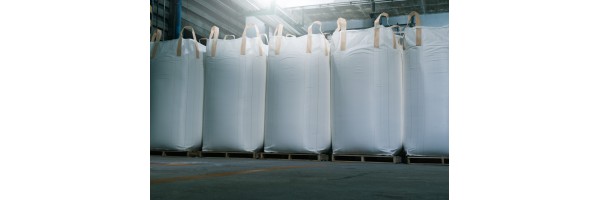
Bulk bags are the most cost-effective and environmentally friendly container due to the fact they can be reused and recycled.
For our latest blog, we are going to talk you through guidelines regarding the reuse of bags plus outline how and when you can recycle them.
Reusing Bulk Bags Explained
FIBCs are built specifically to be flexible and durable plus in certain circumstances, built to be used more than once. A standard bulk bag is rated at a 5:1 safety factor ratio (SFR), meaning it has the ability to hold 5 times the amount of its safe working load (SWL). 5:1 safety ratio bags are single-use bags. Please note, some bags have a higher safety ratio of 6:1, which are designed for multiple uses.
When reusing bulk bags they should only happen if the bag has a 'Closed Loop' system where it is cleaned, reconditioned and qualified for reuse to handle the same product in the same application that the bag was originally designed.
To safely reuse FIBCs follow the guidelines listed below -
Cleaning - Remove all foreign matter from the interior of the bag and ensure statistically held dust is less than 4 ounces total. Replace liner if applicable.
Reconditioning - Replace web ties, labels and tickets critical to safe bag use and cord-locks, if necessary.
Tracking - The manufacturer should maintain a record of origin, the product used in the bag and the number of uses or turns.
Testing - Bulk bags should be randomly selected for top lift testing. The frequency and quantity will be determined by the manufacturer and based on their specific situation.
Here are some reasons why FIBCs can be rejected -
- The lift strap is damaged
- Bulk bag has become contaminated
- Wood splinters
- Printed has smeared, faded or become otherwise unreadable
- The bag has become damp, wet or contains mould
Can I Recycle Bulk Bags?
Most bulk bags are made from virgin polypropylene, a common plastic that can be repurposed into other plastic products. Bags that are suitable for recycling include those to store construction materials, chemicals, grains, fertilisers, pigments and plastics.
Regarding recycling, bulk bags are classified into three different recycling grades -
Grade A - Clean and bright white, but coloured stitching and handles are allowed.
Grade B - Not as clean but predominantly white with minimal colouring.
Grade C - Dirty and or coloured.
Polypropylene bags are collected in large quantities by industrial recycling companies therefore the recycling is only possible for businesses that use large quantities of bags or ones that have the ability to store bags over time.
Bulk Bags from Centurion Packaging
Bags with a 6:1 safety factor ratio, as previously mentioned, are manufactured for multiple uses whilst following the guidance above.
Bulk bags are eco-friendly recyclable containers that can be re-purposed into other plastic products. Recycling used FIBCs is a great way to lower your carbon footprint and run a more environmentally friendly operation.
If you would like to know more about polypropylene bags from Centurion Packaging, please contact us today.

 5% OFF YOUR FIRST ORDER OVER £50! JUST USE COUPON “MY1STORDER” AT THE CHECKOUT FREE NEXT DAY DELIVERY FOR MOST UK MAINLAND ORDERS, PLEASE SEE T&C'S
5% OFF YOUR FIRST ORDER OVER £50! JUST USE COUPON “MY1STORDER” AT THE CHECKOUT FREE NEXT DAY DELIVERY FOR MOST UK MAINLAND ORDERS, PLEASE SEE T&C'S
.jpg)